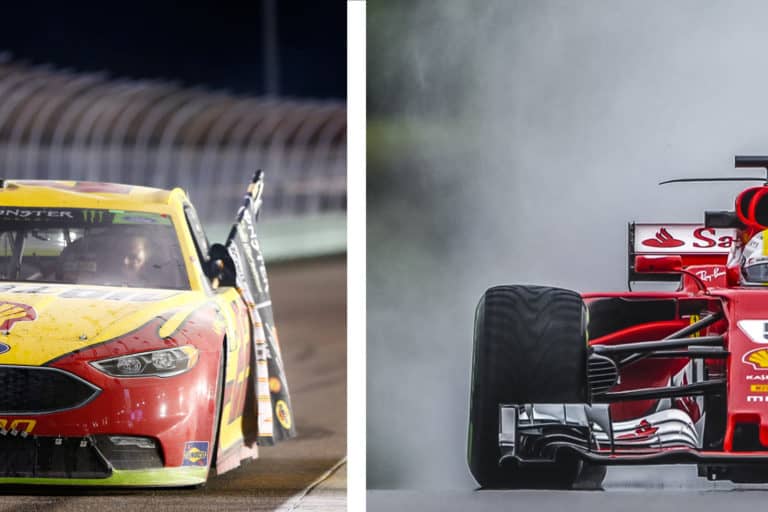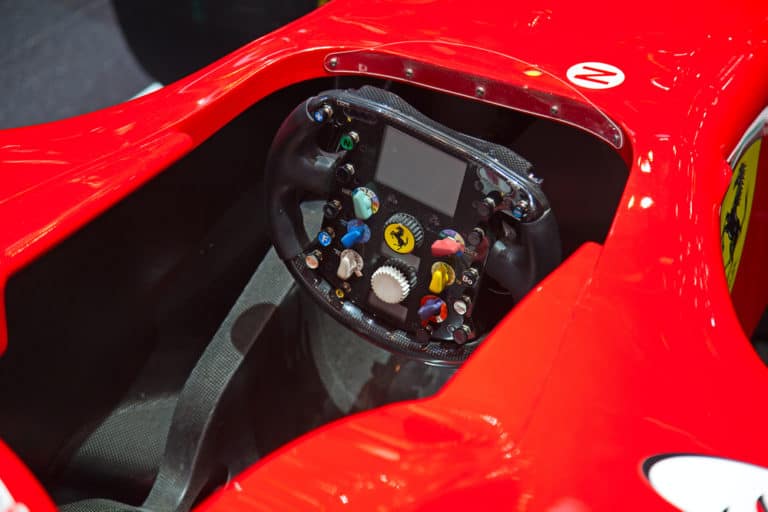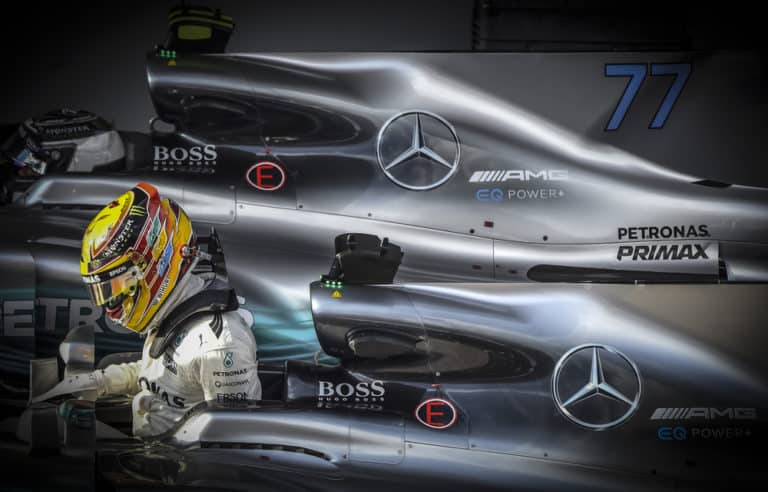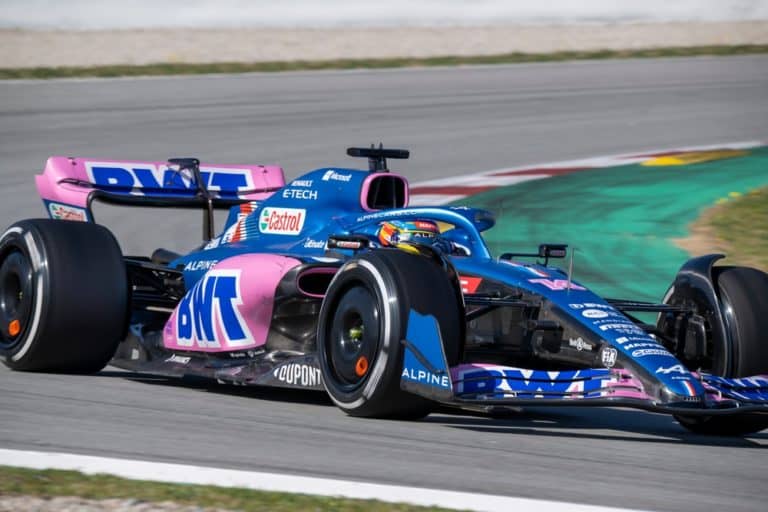It seems that every driver in Formula 1 tries their utmost to qualify in pole position. We all understand that starting in first place is an advantage, but is it really that important to qualify in pole position? How important is pole position in Formula 1?
Starting the race in pole position in a Formula 1 race is very important. Starting first means that there is no one else to overtake. Having no one to overtake makes the race easier to win. Some tracks are only won by the driver who starts in pole position because overtaking is so difficult.
Pole position is the most coveted starting position in every F1 race, but is it really that important? Is it ever better to start further back in the grid? How does tarting in pole increase the chances of winning for a driver? Let’s find out!
If you’re looking for some F1 merchandise, check out the awesome stuff at the official F1 store here.
How Important Is Starting In Pole Position?
It is true that every driver in Formula 1 pushes hard during qualifying to try and start the race in pole position. The fastest driver in qualifying gets to start the race at the front, having no drivers in front of them. Is this really an advantage, and how important is it to start at pole in an F1 race?
Starting in pole position can be vital for an F1 driver. This starting position is so coveted because it offers significant advantages to the driver who starts at the front of the grid. These advantages make it easier for the driver t get a good race start which can determine the outcome of the first few laps of the race.
Beginning the race at the front of the grid also drastically increases the driver’s chance of winning the race. Statistically, 40% of all Formula 1 races are won by the driver who stars in pole position.
This makes pole position the most important starting position on the grid, and this is why the drivers push so hard to win pole position during qualifying.
There are several reasons that make starting in pole position so coveted and important in Formula 1, so let’s take the time to properly examine the most significant reasons, to better understand the importance of this starting position.
Pole Position Advantages At The Race Start
Formula 1 consists of 20 rivers, all in similar cars racing at incredibly high speeds on very difficult racing circuits in very unforgiving conditions. One of the most crucial points of a Formula 1 race is the start of the race, as this often determines how the race will turn out.
The race start is a bottleneck. All 20 drivers begin the race in a grid determined by their lap times in the qualifying session. Every driver starts at the same time, and the race begins with all drivers trying desperately to make it as far up the grid as possible and into the racing line to begin the race.
The driver who begins the race at the front, in pole position, has no other drivers in front of them to contend with.
This means that the driver in pole position is able to simply focus on their racing start and not be too concerned about what the other drivers are doing around them.
Other drivers will close in quickly, but if the driver in pole gets a good start, they are likely to pull away from the rest of the grid fairly quickly, putting them in the best possible position to begin racing hard right from the beginning.
Starting the race in pole position gives the driver a distinct and significant advantage over the other drivers on the grid and makes the driver more likely to win the race overall.
Pole Position Advantages Throughout The Race
Starting the race in pole position also offers advantages throughout the race, not just during the race start.
The driver who begins at the front of the grid has no other drivers in front of them to contend with. This means that there is no one to overtake, and if the driver is able to hold onto first place, the race is already won before it even begins.
Not having any other drivers to overtake means that the driver who started on pole can focus on their driving and getting the most out of their car to increase lap times and draw the most performance possible from the car.
A driver with no other drivers to contend with or overtake is also able to focus on their race strategy and communicate clearly with their race engineer to receive instructions and provide valuable feedback for the team in the pits.
Starting on pole also sets the driver up better psychologically, as they have already beat the rest of the drivers to first place and can now race hard all the way onto the podium.
Pole Position Advantages According To The Circuit
Starting in pole position comes with several race advantages, but there are some circuits where starting on pole is absolutely vital and almost always ensures a race win.
For example, the Monaco Grand Prix is almost exclusively won by the driver who starts on pole. This is simply because the circuit is so tight and difficult that overtaking is incredibly challenging and almost impossible for most drivers.
If no other drivers are able to overtake the driver in first place, that driver will stay in first place all the way to the end of the race. This makes winning pole position for tight circuits crucial for winning the race.
The Likelihood Of Winning After Starting On Pole
The statistics show that more than 40% of Formula 1 races are won by the driver who begins the race in pole position.
This is a staggering reality that demonstrates how significant starting in pole position really is in Formula 1 races.
The driver who starts the race is far more likely to win the race than any other driver. This is not to say that the other drivers do not have a chance of winning the race, there have been many excellent examples of this in F1 races, but the pole position driver is simply significantly more likely to win.
Does The Driver Who Starts On Pole Always Win?
We have looked at some of the distinct advantages of starting a Formula 1 race in pole position, and it is true that almost half of all F1 races are won by the driver who starts on pole, but how often does this really happen in the real world? Does the pole position driver always win?
The truth is that the statistics showing that 40% of race wins are won by pole position drivers are based on the overall race wins since Formula 1 began in the 1940s. In the real world, current Formula 1 race conditions paint a different picture to the races of the past.
In the past, the driver who began the race was more likely to be in the best are on the grid. In modern F1, the cars are more evenly matched, and the driver who starts in pole is more likely to have won their position due to driving skill rather than the performance of their car.
The modern F1 field is far more evenly matched than it used to be, and the chance of a driver winning the race simply because they started on pole is significantly diminished.
Formula 1 has seen some spectacular race wins recently where drivers have made their way from the very back of the grid to go on to win the race overall. There have been plenty of races won by drivers who began in the midfield, and the driver that begins the race in second position is a very good contender for the win as well.
Modern Formula 1 racing is much closer than F1 of the past, and starting in pole position is no longer a guarantee of winning the race. The pole position driver must work as hard as the rest of the drivers to keep their position and stave off the onslaught from the drivers behind them.
One small mistake, one tiny misstep, one seemingly insignificant overcorrection or brake lock-up, and the pole position driver could lose their first-place position and never recover it.
Starting in pole position is incredibly important in Formula 1, but unless the driver has the machinery and skill to hold their position and defend it against other drivers, they will not remain in first place for very long.
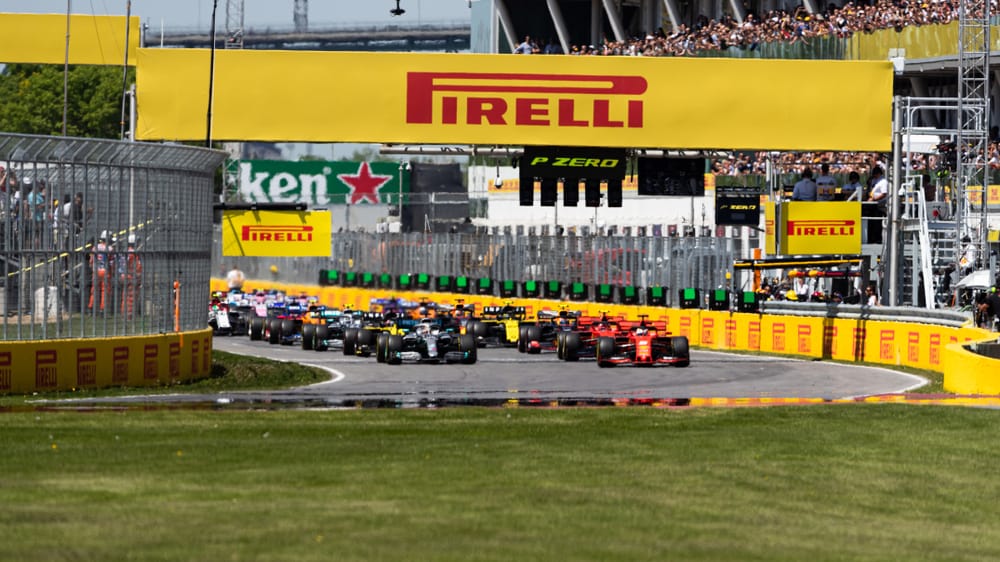
Is It Ever Better To Start Further Back?
We have established that starting in Pole position is a great advantage in Formula 1, but is there a circumstance when starting further back in the grid is more of an advantage than starting the race in pole position?
Pole position is always an advantage, and there are few circumstances when starting further back is better, but it does happen.
Some drivers prefer to start in third position at some particular Grand Prix circuits due to the position of the race start. The Grand Prix races in Spain and Bahrain, for example, begin the race with a very long straight.
The long starting straight leads some drivers to aim for a starting position of third place to take advantage of the clean air created by the leading two cars, allowing the third-place driver to gain an advantage at the first corner of the race.
This strategy is a risk, but it has been proven successful on many occasions. However, starting in pole position is a bigger advantage, regardless of the circuit. This means that many drivers try to qualify either first or third for these races that begin with long straights.
Starting first or third provides better advantages than starting at any other grid position for races of this type, and the most experienced drivers are often able to secure one of these two coveted starting positions to ensure the best possible race outcome for themselves.
How Difficult Is It To Win Pole Position?
The best starting position on a Formula 1 race in pole position, as it offers the most advantages and increases the driver’s chances of winning the race. While pole position is the most coveted starting position, it is also the most difficult starting position to win.
To win pole position, a Formula 1 driver must compete in a qualifying session, or in some instances, a qualifying session and a qualifying sprint race.
Winning pole position in standard qualifying sessions is done by setting the fastest lap time in three qualifying rounds. The fastest driver overall wins pole.
In sprint qualifying, the driver must compete in a qualifying session to determine the starting order of the sprint race, and the outcome of the sprint race determines the starting grid positions of the drivers in the main race event.
This means that to start in pole position, an F1 driver must out race every other driver on the grip or traverse the race circuit in a significantly quicker time than every other driver in the race.
This is a real challenge as most of the cars and drivers in F1 are very evenly matched. The pace of a driver often comes down to raw talent and refined skill. Only the best drivers on the grid will win pole position.
It is a great challenge to win pole position and an even greater achievement. Winning pole position is very difficult to do, so the driver who wins pole definitely deserves to be there.
Conclusion
Pole position is the most crucial starting position on the Formula 1 race grid. The driver who starts on pole has a significantly greater chance of winning the race, and if they can hold onto their lead, the driver will face fewer challenges along the way.
The race start is easier for the pole position river and having no other drivers to overtake ensures a more successful race for the driver.
Almost half of all race wins in F1 history were won by the driver who started on pole. This is why F1 drivers push so hard in qualifying to win this prime starting position!
Pole is important but remember that the driver has demonstrated impressive skill and talent to get into that position, and they have a tough fight ahead f them if they want to hold onto their lead!


